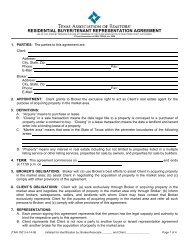financing secrets of a millionaire real estate investor.pdf
financing secrets of a millionaire real estate investor.pdf
financing secrets of a millionaire real estate investor.pdf
You also want an ePaper? Increase the reach of your titles
YUMPU automatically turns print PDFs into web optimized ePapers that Google loves.
52 FINANCING SECRETS OF A MILLIONAIRE REAL ESTATE INVESTOR<br />
Your Credit Score<br />
Much <strong>of</strong> the institutional loan industry is driven by credit. While<br />
having spotless credit is not a necessity, it is certainly a good asset, if<br />
used wisely.<br />
Your credit history is maintained primarily by three large companies,<br />
known as the credit bureaus: Equifax, TransUnion, and Experian<br />
(formerly TRW). Your credit report has “headers” that contain<br />
information about your addresses (every one they can find), phone<br />
numbers (even the unlisted ones), employer, Social Security number,<br />
aliases, and date <strong>of</strong> birth. This information is usually reported by banks<br />
and credit card companies that report to the credit bureaus (be careful<br />
about giving your unlisted address or phone number to your credit<br />
card company—it may end up on your credit file). Some information<br />
comes from public records, such as court filings and property records.<br />
Your credit report also contains a history <strong>of</strong> nearly every charge<br />
card, loan, or other extension <strong>of</strong> credit that you ever had. It will show<br />
the type <strong>of</strong> loan (e.g., installment loan or revolving credit), the maximum<br />
you can borrow on the account, a history <strong>of</strong> payments, and the<br />
amount you currently owe. It will also show information from public<br />
records, such as judgments, IRS liens, and bankruptcy filings. Some<br />
debts are reported by collection agencies, such as unpaid phone, utility,<br />
and cable TV bills. Your credit report will also show every company<br />
that pulled your credit report within the past two years (called<br />
an “inquiry”).<br />
How long does information stay on my credit report In theory,<br />
information stays on your credit report indefinitely. However, federal<br />
law—the Fair Credit Reporting Act (FCRA)—requires that any negative<br />
remarks be removed upon request after seven years (except for<br />
bankruptcy filing, which may remain for ten years). If you don’t ask,<br />
however, negative information won’t always go away.










